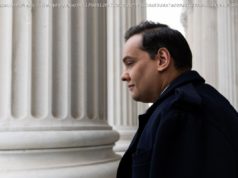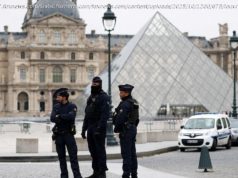 President Donald Trump’s temporary immigration ban faces crucial legal hurdles this week that could determine whether he is able to push through the most far-reaching and controversial policy of his first two weeks in office.
President Donald Trump’s temporary immigration ban faces crucial legal hurdles this week that could determine whether he is able to push through the most far-reaching and controversial policy of his first two weeks in office.
On Monday, the government has a deadline to justify the executive order temporarily barring immigrants from seven mostly Muslim countries and the entry of refugees after a federal judge in Seattle blocked it with a temporary restraining order on Friday.
The uncertainty caused by a judge’s stay of the ban has opened a window for travelers from the seven affected countries to enter the United States.
Trump has reacted with attacks on the federal judge and then the wider court system which he blames for styming his efforts to restrict immigration, a central promise of the Republican’s 2016 presidential campaign.
Democrats, meanwhile, sought to use Trump’s attacks on the judiciary to raise questions about the independence of his Supreme Court nominee, Neil Gorsuch.
The 9th U. S. Circuit Court of Appeals in San Francisco over the weekend denied the Trump administration’s request for an immediate stay of the federal judge’s temporary restraining order that blocked nationwide the implementation of key parts of the travel ban.
But the court said it would reconsider the government’s request after receiving more information.
The government has until 1am Irish time to submit additional legal briefs to the appeals court justifying Trump’s executive order. Following that the court is expected to act quickly, and a decision either way may ultimately result in the case reaching the U. S. Supreme Court.
Several technology giants have filed a legal brief in the 9th Circuit late on Sunday opposing Trump’s immigration order, describing it as harmful to business.
Trump, who during his campaign called for a temporary ban on Muslims entering the United States, has repeatedly vowed to reinstate the January 27 travel ban on citizens from Iran, Iraq, Libya, Somalia, Sudan, Syria and Yemen and a 120-day bar on all refugees in the name of protecting the United States from Islamist militants.
In an interview with Fox News this weekend he defended the travel ban again and denied that his advisors did not know the stipulations of the order.
„I think it was very smooth: You had 109 people out of hundreds of thousands of travelers, and all we did was vet those people very carefully,“ Trump said in the interview.
„That’s not what [Homeland Security Secretary] Gen. Kelly said. He was aware of it and it was very smooth,“ he added.
His critics have said the measures are discriminatory, unhelpful and legally dubious.
However, the White House remains confident that the ban will be reinstated after the court challenge.
„We’ll accomplish the stay and will win the case on the merits,“ Vice President Mike Pence said.
Members of Mr Trump’s Republican Party scolded him for Twitter attacks on US District Court Judge James Robart, appointed by former president George W. Bush, and accused Mr Trump of stepping over the line that separates the executive from the judiciary.
To Mr Trump, Judge Robart is a „so-called judge“ whose „ridiculous“ ruling „will be overturned“.
Mr Trump renewed his Twitter attacks against Judge Robart on Sunday.
„Just cannot believe a judge would put our country in such peril. If something happens blame him and court system. People pouring in. Bad! “
He followed with another tweet saying he had instructed the Homeland Security Department to check people coming into the country but that „the courts are making the job very difficult! “
Vice President Mike Pence defended Mr Trump, saying „the president can criticise anybody he wants“.
Mr Pence added that he believes the American people „find it very refreshing that they not only understand this president’s mind, but they understand how he feels about things“.
At issue is the legality of a presidential action undertaken in the name of national security.
Whatever the outcome and however the case drags on, a president who was used to getting his way in private business is finding, weeks in to the job, obstacles to quickly fulfilling one of his chief campaign pledges.
The government had told the appeals court that the president alone has the power to decide who can enter or stay in the United States, an assertion that appeared to invoke the wider battle to come over illegal immigration.
Congress „vests complete discretion“ in the president to impose conditions on entry of foreigners to the United States, and that power is „largely immune from judicial control“, according to the court filing.
„We don’t appoint judges to our district courts to conduct foreign policy or to make decisions about the national security,“ Mr Pence said.
Additional reporting by PA.






